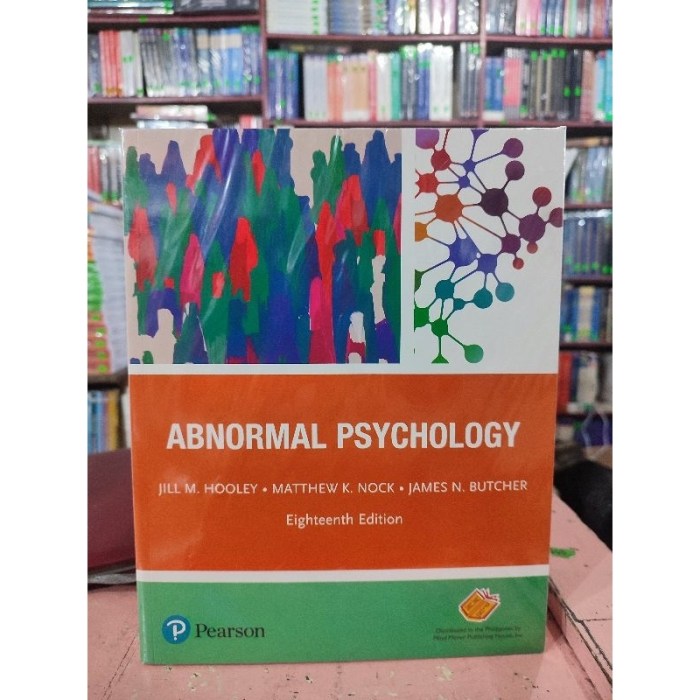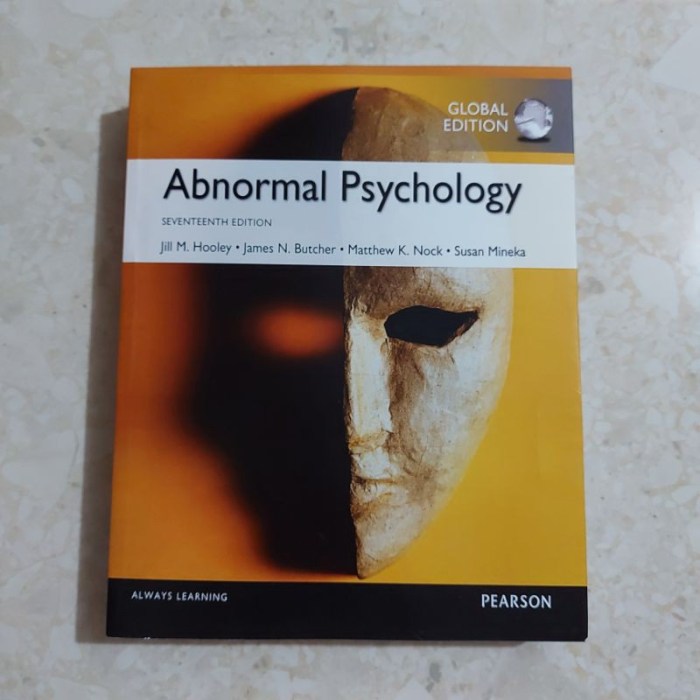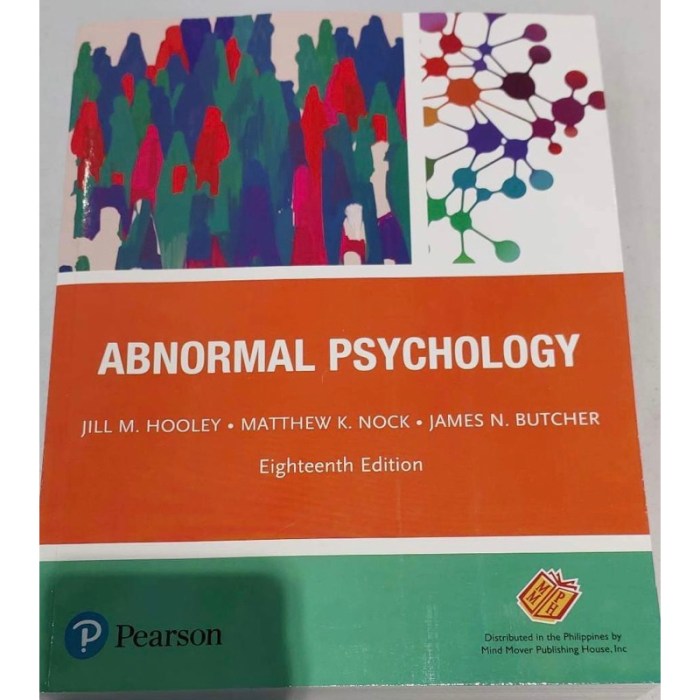Abnormal psychology 18th edition by hooley nock & butcher – Abnormal Psychology, 18th Edition by Hooley, Nock, and Butcher embarks on an intellectual journey, delving into the complexities of mental health and the factors that shape it. This comprehensive text serves as an authoritative resource for students, practitioners, and anyone seeking a deeper understanding of the field.
Through its in-depth analysis and evidence-based insights, this edition provides a thorough exploration of the historical roots, diagnostic criteria, etiological factors, assessment techniques, and treatment approaches for a wide range of mental disorders.
Introduction to Abnormal Psychology, 18th Edition by Hooley, Nock, & Butcher

Abnormal Psychology, 18th Edition by Hooley, Nock, & Butcher is a comprehensive textbook that provides an overview of the field of abnormal psychology. The textbook is written by three authors who are experts in the field, and it is intended for use by students in undergraduate and graduate courses in abnormal psychology.
The textbook covers a wide range of topics, including the history of abnormal psychology, the classification and diagnosis of mental disorders, the etiology of mental disorders, the assessment and treatment of mental disorders, and special topics in abnormal psychology.
The purpose of abnormal psychology is to understand the nature and causes of mental disorders, and to develop effective treatments for these disorders. Abnormal psychology is a field of study that is constantly evolving, and new research is constantly being conducted to improve our understanding of mental disorders and their treatment.
Historical Perspectives on Abnormal Psychology

The history of abnormal psychology can be traced back to ancient Greece, where philosophers such as Hippocrates and Aristotle wrote about mental illness. In the Middle Ages, mental illness was often attributed to demonic possession or witchcraft. In the 19th century, the development of psychiatry as a medical specialty led to a more scientific understanding of mental disorders.
Emil Kraepelin and Sigmund Freud were two of the most influential figures in the development of abnormal psychology. Kraepelin developed a system for classifying mental disorders that is still used today. Freud developed a theory of psychoanalysis that has had a profound influence on the understanding and treatment of mental disorders.
Key Figures and Their Contributions
- Hippocrates: Viewed mental illness as a medical condition, not a divine punishment.
- Aristotle: Believed that mental illness was caused by an imbalance of the four humors (blood, phlegm, yellow bile, black bile).
- Emil Kraepelin: Developed a system for classifying mental disorders that is still used today.
- Sigmund Freud: Developed a theory of psychoanalysis that has had a profound influence on the understanding and treatment of mental disorders.
Classification and Diagnosis of Mental Disorders: Abnormal Psychology 18th Edition By Hooley Nock & Butcher
The classification and diagnosis of mental disorders is a complex process that involves a variety of factors. The most widely used diagnostic system is the Diagnostic and Statistical Manual of Mental Disorders (DSM), which is published by the American Psychiatric Association.
The DSM provides criteria for diagnosing mental disorders, and it is used by clinicians around the world.
Diagnostic Systems
- Diagnostic and Statistical Manual of Mental Disorders (DSM): The most widely used diagnostic system for mental disorders.
- International Classification of Diseases (ICD): Another widely used diagnostic system for mental disorders.
Common Mental Disorders and Their Diagnostic Criteria
- Anxiety disorders: Characterized by excessive fear or anxiety.
- Mood disorders: Characterized by disturbances in mood, such as depression or mania.
- Schizophrenia: A severe mental disorder characterized by hallucinations, delusions, and disorganized thinking.
- Personality disorders: Characterized by inflexible and maladaptive personality traits.
Etiology of Mental Disorders

The etiology of mental disorders is complex and involves a variety of factors, including biological, psychological, and social factors. Biological factors include genetics, neurochemistry, and brain structure. Psychological factors include personality traits, coping mechanisms, and life experiences. Social factors include poverty, discrimination, and trauma.
Biological Factors
- Genetics: Mental disorders can run in families, suggesting that there is a genetic component to their development.
- Neurochemistry: Neurotransmitters are chemicals that allow neurons to communicate with each other. Imbalances in neurotransmitters can lead to mental disorders.
- Brain structure: Abnormalities in brain structure can also contribute to the development of mental disorders.
Psychological Factors
- Personality traits: Certain personality traits, such as neuroticism and introversion, can make individuals more vulnerable to developing mental disorders.
- Coping mechanisms: Individuals who have poor coping mechanisms are more likely to develop mental disorders when faced with stress.
- Life experiences: Traumatic life experiences, such as childhood abuse or neglect, can increase the risk of developing mental disorders.
Social Factors, Abnormal psychology 18th edition by hooley nock & butcher
- Poverty: Poverty is associated with an increased risk of developing mental disorders.
- Discrimination: Discrimination can lead to stress and anxiety, which can contribute to the development of mental disorders.
- Trauma: Trauma, such as war or natural disasters, can increase the risk of developing mental disorders.
Assessment and Treatment of Mental Disorders
The assessment and treatment of mental disorders involves a variety of methods. Assessment methods include clinical interviews, psychological testing, and neuroimaging techniques. Treatment methods include psychotherapy, medication, and cognitive-behavioral therapy.
Assessment Methods
- Clinical interviews: Clinical interviews are used to gather information about a patient’s symptoms, history, and current functioning.
- Psychological testing: Psychological testing can be used to assess a patient’s cognitive functioning, personality traits, and emotional state.
- Neuroimaging techniques: Neuroimaging techniques, such as MRI and fMRI, can be used to visualize the brain and identify abnormalities that may be associated with mental disorders.
Treatment Methods
- Psychotherapy: Psychotherapy is a type of talk therapy that can help patients to understand and change their thoughts, feelings, and behaviors.
- Medication: Medication can be used to treat a variety of mental disorders, such as depression, anxiety, and schizophrenia.
- Cognitive-behavioral therapy (CBT): CBT is a type of therapy that helps patients to identify and change their negative thoughts and behaviors.
Questions and Answers
What are the key theoretical perspectives in abnormal psychology?
Abnormal Psychology, 18th Edition explores various theoretical perspectives, including psychodynamic, behavioral, cognitive, humanistic, and biological approaches.
How does the DSM-5 differ from the ICD-10 in diagnosing mental disorders?
While both the DSM-5 and ICD-10 provide diagnostic criteria for mental disorders, they differ in their specific symptom requirements and diagnostic thresholds.
What are the major factors that contribute to the development of mental disorders?
Abnormal Psychology, 18th Edition emphasizes the complex interplay of biological, psychological, and social factors in the etiology of mental disorders.